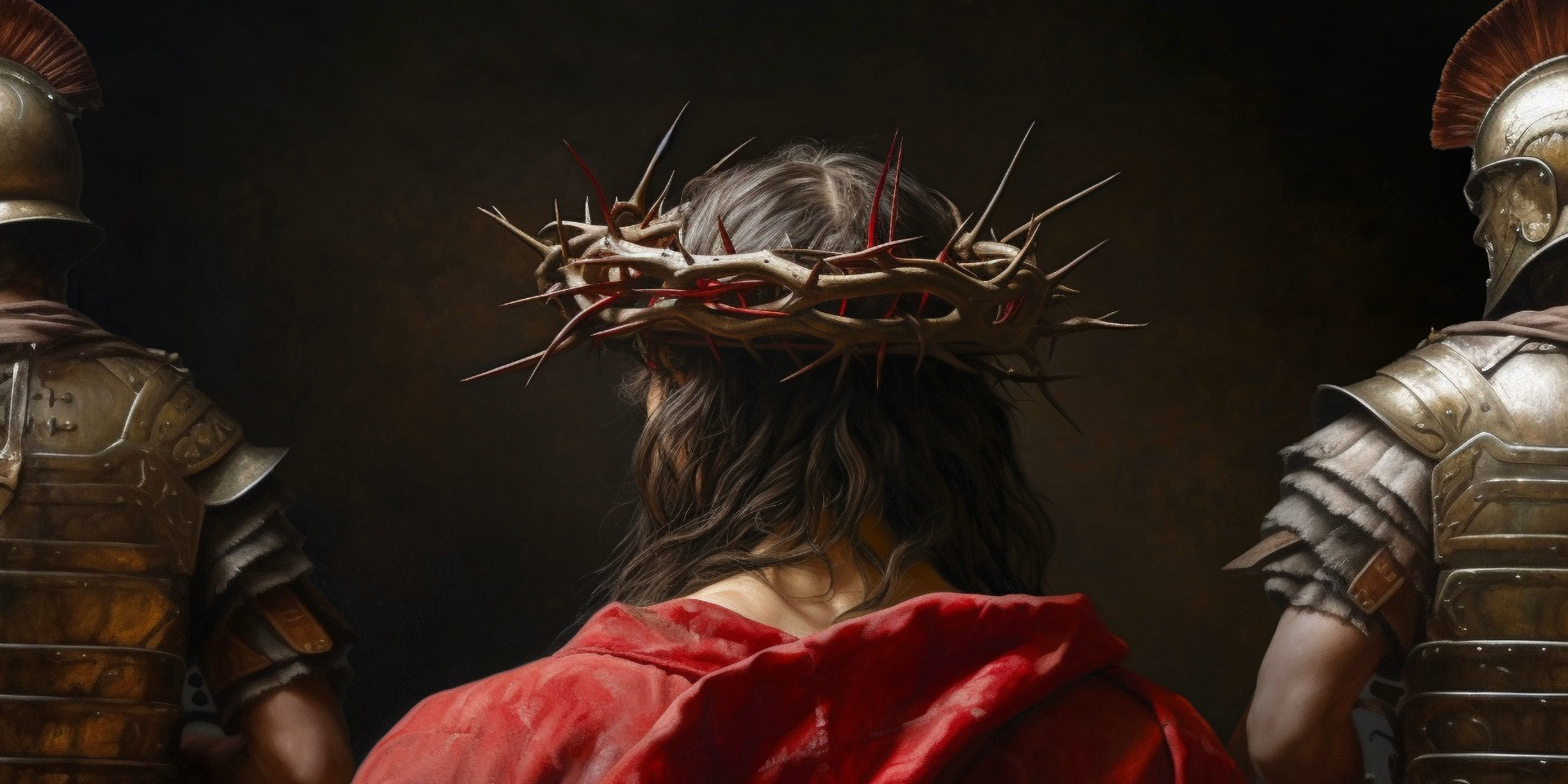Slapped, spat in the face, insulted, falsely accused, lashed, ridiculed with a crown of thorns, passed from judge to judge and booed by the crowd, the Son of God chose the most unusual form of defence. Silence.
The famous logotherapist Victor Frankl, a survivor of four camps, including Auschwitz, described the prisoner who gave up the fight for survival: “Usually it began with the prisoner refusing one morning to get dressed and wash or go out on the parade grounds. No entreaties, no blows, no threats had any effect. He just lay there, hardly moving. If this crisis was brought about by an illness, he refused to be taken to the sick-bay or to do anything to help himself. He simply gave up.”[1] When a man refused to speak, to react to what was happening around him, to communicate with those close to him, when he limited himself to taking a cigarette from his pocket and waiting for a light, everyone knew that his end was near.
After his arrest, in circumstances similar to those of the Nazi camps, but with added tragedy, Christ seemed to give signs of refusal and renunciation of life. His paradoxical reactions during the six interrogations, completed in less than twenty-four hours, puzzle the reader of the Gospels. Was Jesus consciously trying to give His judges additional reasons to condemn Him to death? Having preached respect for physical and spiritual life, which are inseparable, it would be illogical for Jesus to be indifferent to His own life. However, the evangelists’ accounts, judged from the perspective of human reason, raise questions about some of the attitudes of Jesus in the hours before His crucifixion. The inexplicable reality of Jesus’s reactions to the mock trial must have a motivation hidden from our eyes.
A lapse of tact or…impact?
Evidently, the actions and words of Jesus were “politically incorrect.” In the eyes of the priests, scribes, and Pharisees, He was a threat to the stability of the religious and social life of the Jewish people. This was the premise used to legitimise a trial riddled with procedural irregularities. But what is even more shocking is the lack of defence in the trial of Christ. No one defended Him and no one was outraged by the unfairness of the trial; what is even more puzzling is that the defendant Himself did nothing to defend Himself. And to deepen the mystery, His Father, who had confirmed on several occasions that He took pleasure in His Son (Matthew 3:16-17), remained silent throughout the trial and even at the climax of the passion of Christ—the crucifixion.
It is curious that during the interrogations Jesus talked more with the Roman governor than with the Jewish leaders, who had the knowledge to understand the spiritual aspects of His statements and ideas more easily. When asked by Pilate if He was the King of the Jews, instead of giving an explanation, Jesus replied with a counter-question: “Is that your own idea, or did others talk to you about Me?” (John 18:34). Faced with the contradictory testimony of lying witnesses, Jesus remained silent “unjustifiably.” Instead, at the diabolical insistence of the high priest, He confessed, apparently without any logic, that He was the Son of God, even though during His life He had clearly tried to prevent the proclamation of His Messiahship.
“If you are not going to defend yourself, at least do not incriminate yourself,” any of the disciples would have suggested to Him, had they stuck with Him through thick and thin. Presented to Herod, Jesus maintained the same ominous silence. While John the Baptist had publicly denounced Herod’s sins at the risk of his own life, Jesus, with the overwhelming argument of the power to take or give life on His side, when brought before the mocking tyrant curious to see a “miracle” show, said not a word. For the witness of these scenes, then or now, the questions follow in agonising succession: Why? Who was served by this silence? Who won and who lost?
The normality of the abnormal
In 1971, one of the bloodiest riots in US history took place at Attica prison in New York. The day before the riot, more than five hundred inmates entered the mess hall and sat down in rows, not to eat or pray, but with their heads bowed in deathly silence, to express their defiance of the prison administration and the guards who were not responding to their demands. A guard, now retired, later recalled that this silence, this silent protest, was a terrifying sign of the rebellion to come. More than thirty prisoners and ten guards died in the riot.
It is normal in the general mindset of people to justify themselves as thoroughly as possible or, when the anger is at a peak and the struggle is unequal, to silently prepare for revenge and to unleash full force on the opponent at the right moment. According to the law of retaliation, it is natural to respond in kind. According to social ethics, when your rights are violated or when you find yourself on trial, it is normal to say everything you know to defend yourself, to hire the best lawyer and to use all the legal means to ensure that you win.
None of the rights normally used by those threatened with imprisonment or even death were called for by the prisoner taken before Annas and Caiaphas. He did not acknowledge any form of defence as valid and worthy. Moreover, Jesus did not even explain why He rejected the forms of human rights that were highly valued in an unequal, corrupt, and competitive society. Seven hundred years before His trial, one of the Old Testament prophets had seen Him in the controversial role of the silent defendant: “He was oppressed and afflicted, yet He did not open His mouth; He was led like a lamb to the slaughter, and as a sheep before its shearers is silent, so He did not open His mouth” (Isaiah 53:7). The silence of Jesus during the trial, which had been foretold centuries before, was not explained by the prophet Isaiah either.
The words of silence
Jesus’s silence is linked to His mission to save humanity from sin. Without being guilty, He took upon Himself the sin of the humanity He loved so much. We find this theme of substitution even before His crucifixion, in His controversial silence itself: “Silence is actually one of the prominent themes we can trace through the passion of Jesus Christ… When Jesus Christ took our sin, He took all of the punishment that goes with that sin. A part of that punishment is shame. Had Jesus defended Himself and protested His innocence, He would have suffered no shame, and that would have left us guilty… Jesus held back any words that would have relieved Him from the shame and blame of sin. He was not a sinner, but He took fully the sinner’s place… In other words, if Jesus had taken up His own defence with the intention of refuting His accusers and proving His innocence, He would have won! But we would have lost, and we would be lost for all eternity.”[2]
If His silence was not a feature of abnormality, but a choice that sought the greatest good for humanity, if His renunciation of justification before the judges was not an abandonment of life, but an attitude that opened the door to human salvation, if His silence was a judgement in our favour, it becomes essential to understand the reasons for this silence, which speaks to us of the gift of grace.
He was silent because it was useless and futile to speak when our ears are deaf and our eyes are blind to the truth. “Do you have eyes but fail to see, and ears but fail to hear?” (Mark 8:18).
He remained silent because justifications are more a matter of human dialectics than of God. Humans defend themselves, they excuse themselves, but God affirms and confirms Himself. He does not prove that He is the Creator of this world, but He affirms it (Genesis 1:1).
He was silent because if He had spoken, He would have had to accuse, and He didn’t want to condemn: “Jesus straightened up and asked her, ‘Woman, where are they? Has no one condemned you?’ ‘No one, sir,’ she said. ‘Then neither do I condemn you,’ Jesus declared. ‘Go now and leave your life of sin'” (John 8:10-11). He suspends condemnation and waits for our final decision.
He stayed silent because the judges already had the “truth.” Whatever He might have said was irrelevant. Only their truth mattered. They were capable of dying for their cause, which was riddled with pride, and for the Sabbath Law, which was suffocated by a few hundred human rules, but they were not capable of acknowledging the Lord of the Sabbath.
He remained silent because He had not come to spare His own life, but to give it in order to save mankind from death, so that they might learn the lesson of total surrender: “For whoever wants to save their life will lose it, but whoever loses their life for me will save it” (Luke 9:24).
He was silent because His works and those of His Father testified to Him; He did not need to be defended by people. He defended Himself by His own righteous life: “The Son of Man came eating and drinking, and they say, ‘Here is a glutton and a drunkard, a friend of tax collectors and sinners.’ But wisdom is proved right by her deeds” (Matthew 11:19).
He remained silent because His defence would have polarised sinners into opposing camps, so He prayed to His Father that they might all be one: “My prayer is… for those who will believe in me through their message, that all of them may be one, Father, just as you are in me and I am in you. May they also be in us so that the world may believe that you have sent me” (John 17:20-21).
He was silent because His words were beyond human understanding. His words were from a lexicon unknown to those who were unwilling to renounce the language of lawlessness: “On hearing it, many of His disciples said, ‘This is a hard teaching. Who can accept it?'” (John 6:60).
He remained silent because His argument would have been destructive. His silence was actually a manifestation of love: “He will take great delight in you; in His love He will no longer rebuke you, but will rejoice over you with singing” (Zephaniah 3:17).
He was silent because He was willing to die as a guilty man! And that judgement came from His Father: “God made Him who had no sin to be sin for us, so that in Him we might become the righteousness of God” (2 Corinthians 5:21). Sinless, Jesus was willing to take upon Himself all human guilt, the guilt of all people of all times.
The silence that does not save
In a world of excessive speaking and inflation of words, the silence of Jesus is a scandal to reason. The unsatisfied human “Why?” demands a judgement on the silence of the One who is the Word of life. Hungry for justification, human nature is captive to the Roman dictum: “Qui tacet, consentire videtur” (He who is silent, consents). At the root of this concept is the secular view that the individual is his or her own advocate, whose only solution is to save him- or herself. While people defend themselves by passing judgement, Jesus Christ is silent.
He was silent then, He is silent now. He is only silent when He has said all He has to say: “He would not work a miracle to gratify curiosity. Christ had come into the world to heal the broken-hearted. Could He have spoken any word to heal the bruises of sin-sick souls, He would not have kept silent. But He had no words for those who would but trample the truth under their unholy feet.”[3]
Giovanni Papini, in his book on the life of Jesus, gives a revealing explanation: “Jesus did not speak, but looked about Him with His great calm eyes, at the troubled and convulsed faces of His assassins, and for all eternity judged these phantom judges. In a flash every one of them was weighed and condemned by that look which went straight to the soul. Were they worthy to hear His words, those flawed, self-seeking souls, empty and inane, those of them that are not ulcerous and moribund? How could He ever, by the most unthinkable prodigy, stoop to justify Himself before them?”[4] Papini’s theory is that Jesus did not keep silent because He was being judged, but by keeping silent He was judging!
His silence is astonishment mixed with helplessness, like that of a father who, having exhausted all the arguments of love in the face of an insensitive and rebellious son, chooses to remain silent. His refusal to speak before Herod and the priests who had accused Him is the last attempt to rehabilitate them. Yes, His silence is a judgement on sin and the sinner as a result of humanity’s final decision to put its judgement first. It is not His silence that ends love, but man’s speaking of his own righteousness. In the end, His silence will be an audible condemnation: “I don’t know you” (Matthew 25:12) is the echoed expression of those who have chosen not to know Him in His role as Father and Saviour, and who continue to make Him irrelevant to their lives. The choice of this condemnation is not God’s, but mankind’s; the Creator merely pronounces it.
The silence that saves
The withdrawal into silence of the Son of God is not an irrevocable rejection, but an invitation to be sought by those who, tired of so much self-seeking, make the true and saving choice: “Truly you are a God who has been hiding himself” (Isaiah 45:15). The emptiness of existence in the soul of man bears the perfect form of God. The first step of the desire to live like Him brings the Creator out of ‘hiding’.
The same silence enters into a trial with humanity and suspends the judgement that, ready to pronounce an eternal absence of life, stops the prosecution and allows time for the final decision. “When the sentence for a crime is not quickly carried out, people’s hearts are filled with schemes to do wrong” (Ecclesiastes 8:11). Although the postponement of judgement could be interpreted as an opportunity for a private life of lawlessness, in the meantime the arguments of the unconditional love of the Teacher of Galilee present themselves to the undecided.
Christ’s silence is the starting point for man’s self-examination and the crossroads of the Christian, from which the reborn person can begin: repentance. “When you did these things and I kept silent, you thought I was exactly like you. But I now arraign you and set my accusations before you” (Psalm 50:21). Christianity is based on the abandonment of all defences in the face of the redemptive question: “Are you guilty?” By initiating silence, the person who recognises the glaring nature of persistent sin will hear from the defence lawyer: “Acquitted!”
By refraining from speaking in order to express the truth that condemns in an explicit way (and that would harden the hearts of those who have not definitively rejected Him), Jesus brings back the great possibility of rehabilitation, which is grace. His silence is grace applied to every person, no matter how much evil they plan and do, because in grace are the resources of the Word that transforms the mind and the Spirit of God that renews life.
If Christ’s silence would thankfully lead to man’s silence, defined by the end of all his efforts to save himself, his obedience and his entry into the kingdom of the Saviour’s love will lead him to a second silence: “He will rejoice over you with joy; He will rest [in silent satisfaction] and in His love He will be silent and make no mention [of past sins, or even recall them]; He will exult over you with singing” (Zephaniah 3:17, AMPC).
It will be a silence that confirms the passage on the side of the silence of the Lamb.




















